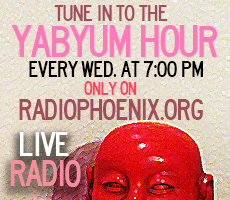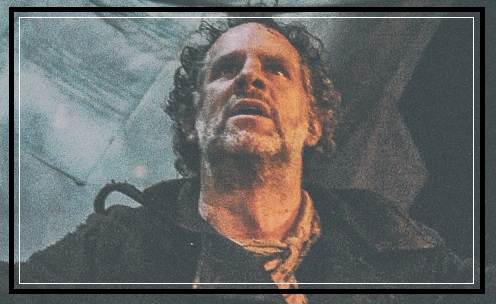
All photos by Niccole Radhe
by Bob Hanshaw
Contributing Writer
“I guess we just reached that point where we were just like ‘fuck it,’ we reached the edge of the cliff, and instead of just standing there and peering over, we’ve all just been aggressive about it and jumped. I guess we really figured we’ve got nothing to lose.” Simone Stopford met me downtown, late at night, to talk about Burning Palms – a band with madcap energy and formidable organization behind it.
Julia DeConcini, the band’s co-frontwoman, adds: “[This] is our mantra, ‘No Day Jobs In 2015’… it might also mean ‘No Homes,’ but…” She and Simone laugh, and Simone finishes her sentence. “We’ll sacrifice that.”
Given the huge strides the band has made in a mere year of existence, that’s no surprise. They are totally committed to the project and it shows: They are currently on a 5-week national tour marked by an appearance at CMJ in New York. They have dedicated fan bases in San Diego and in Los Angeles, where they play monthly – though they live and work in Tucson. They signed with LA-based Lolipop Records for their debut release, s/t. And they’re already working up enough material for a second album. Burning Palms is clearly a band to be reckoned with.
 AN AUSTRALIAN PAGAN ON CONGRESS STREET
AN AUSTRALIAN PAGAN ON CONGRESS STREET
“I moved out here to study yoga and to try and start writing an album, because I lived in LA before this, and Sydney before that. And in both cases, it was just really hectic, there wasn’t enough headspace.” Stopford pauses. “Like, over here, it’s quite open, I think it’s the perfect place to give birth to a project. But I was just going to stay here for 3 or 4 months. It’s been two years.”
Tucson has a kind of magnetism like that. There hasn’t been too much of an exodus in previous years – no more than any other city of our size – and the people who did leave, seem to be keeping up with things now. Some are moving back. They see what’s happening.
“I love it. I feel very much at home in the Southwest.” But for Stopford, it’s not just about the burgeoning arts community here. “I find being in the outdoors really inspiring as far as music is concerned… just the magic and mysticism of the desert. And the fact that [the desert] is 10 minutes from here, that’s a big help. I live in Armory Park.” In the heart of downtown, not far from where we’re speaking, the wild desert is still close enough to call home.
“Home” isn’t too strong a word for it, either. “I’ve been pagan for… really since my younger teenage years. My mom’s pagan. It’s always just been a big part of who I am and how I go about my day to day life.” Paganism is part of the Burning Palms aesthetic, of course – the whole “witch rock” moniker, the dark-magic imagery, the lyrical themes – but it runs deeper than that. Simone genuinely needs nature around her. “Which is why LA didn’t work, you know, it’s like concrete.”
Simone shares this deep-rooted love of nature with her bandmate. “That’s when Julia and I are really the most at home, is kind of like barefoot in the sand. I mean we’d probably just be naked most of the time if we could.” They laugh, but it’s hard to tell how much of that was a joke.
 YOUNG HUNTER
YOUNG HUNTER
“I still feel like it’s a little soon.” Julia DeConcini is hesitant to talk about Young Hunter. But that band, along with Dream Sick and a few others, was a clear precursor to the scene I’m documenting. Those few bands mostly drifted apart or faded out in the last few years, but their members went on to form some of the best bands in Tucson today. And the community they started was distinct, in a lot of ways, from the Red Room-centered, highly improvisational “desert rock” phenomenon that had come before. It was louder, rougher, more diverse in genre, more self-consciously strange: all things that a lot of Tucson bands are now expanding on.
DeConcini did ultimately consent to talk about Young Hunter. She explained that it started out as Benjamin Blake and herself, touring down the West Coast as a folk duo after they met in college in Washington. “[We] went camping and hiking, made gas money by playing small venues. And that was my first introduction to touring, and to playing music in that capacity.”
But Tucson, Julia’s hometown, called them in. “We moved back to Tucson, and continued to play with friends and record, and realized how fabulously incestuous and collaborative Tucson is with musicians. So we did a lot of projects with other people, brought in other people, recorded with other people, both our own [music] and other people’s.”
“I think we reached this point where… the songs were getting really intense and lyrically very powerful, and a folk duo wasn’t fitting where it was trying to go. And I think another part of it was that we just didn’t like playing in bars and getting overpowered by a loud crowd… [and] we didn’t want to play coffeeshops.”
“We started bringing in friends, and we joked for a while about starting a metal band…. And then it happened. Somehow it became a 7-piece metal band. So we did that.”
“And we had a great run. And Ben is doing a show tonight in Portland with the new incarnation of Young Hunter.”
Stopford says, “He basically writes all the parts so he can slot anyone in.”
“Yeah, he has a clear vision,” DeConcini says. She is never anything but charitable talking about Young Hunter, even though the facts of the matter make it clear that it must have been fairly rocky: a band she started with a boyfriend, now in a different city playing under the same name, without her.
But it lives on, as Stopford sees it. “What I think you brought from Young Hunter to [Burning Palms], the main thing, is this primal, earthy element.”
 BAND OF PALS
BAND OF PALS
Julia gives credit where it’s due. “Basically the one who put it all together is Simone. She went around and plucked everyone up.”
Simone nods. “I kind of meditated for a long time on exactly what I wanted the band to look and sound like, initially. And I hadn’t been in Tucson for very long, but I knew those people were out there.”
She didn’t have anything too specific in mind for the men in the group: open-minded, easy to work with, high level of musicianship. “But when it came to Julia, I had a very fixed vision of the kind of woman that I was after. Like down to her aesthetic, how I wanted her to look, how I wanted her to sound. So I was putting feelers out in town, and everyone was like, ‘Oh, you need to talk to Julia from Young Hunter.’ […] I had never seen them before, but I just went along to Congress for their very last show, and I just kind of grabbed her.” Julia interrupts. “As I was coming down off the stage.”
Simone laughs. “[I told her,] ‘You’re gonna be in Burning Palms.’ She really didn’t have any say in the matter… I was kind of blown away when I saw her, because I was like, ‘Wow, this is the exact person I’ve been envisioning.’”
The chemistry between DeConcini and Stopford is palpable and infectious. They finish each other’s sentences, talk over each other, laugh all the time, make cracks about each other. This is just during our single interview. They conduct themselves like old friends, though they have no history together whatsoever before Burning Palms.
They split the many responsibilities of running a band: “Simone is really good at public relations, and she’s great at correspondence and great with follow-through, and is super reliable and charming and organized,” DeConcini says.
“I basically am the manager,” Stopford says. But DeConcini pulls her own weight: “And then I’ve kind of been taking over coordinating with the arts side, like music videos, flyers, photos.”
“Like the visual side of things, because Julia’s an artist, a photographer. An artiste.” For all that Stopford put together the band with a specific aesthetic in mind, DeConcini is elaborating on that aesthetic in a very compelling way. Burning Palms has some of the most striking imagery of any band in Tucson.
 A MORE AGGRESSIVE APPROACH
A MORE AGGRESSIVE APPROACH
That imagery is evolving along with the music. “What it comes down to is that we’re a lot more aggressive,” says Stopford. DeConcini continues, “In the entire approach, from music to videos to tour, [everything] is more aggressive.”
That aggression is manifested in sometimes-brutal minitours to southern California (and occasionally Las Vegas), which the band takes almost every month. They’ve been known to pack as many as 5 shows into a single weekend, sometimes coupled with shooting for a music video or doing soundtrack work for silent films (the Mary Pickford Foundation invited them to record some of the latter for a documentary and traveling exhibit slated for 2015).
Of their current 5-week tour, Julia says, “I know it’s going to seem wrong, having a leisurely tour where we don’t have a thousand people to meet and things to do every day.”
Indeed, it will begin just as hectic as any of their other tours were. Rory O’Rear, the head bartender at R Bar on Congress, shot a new video for them on the first day they set out. “He’s like ‘We looked up the drive to El Paso, and it’s 4 hours, so if you leave by this time, we can shoot in the morning before you leave.’ And we’re like OK! Let’s do it!”
This is more or less par for the course. On an earlier outing, they met someone at a Lolipop Records show, and ended up shooting “this crazy video” for 10 hours in the desert northeast of LA. It’s all set to be a doozy. Simone and Julia tell it in rapid-fire style.
“Nika [Kaiser] is doing some of the things she’s best at, which is making magic, torturing us…” “We’re like naked, with fake wet hair sliding down our backs. That happened.” “She had us lay in ants in the desert, let them bite us.” “And broken glass.” “Snakes slithering all over our bodies. That kind of thing.” “Shining mirrors in each other’s eyes in the desert.” “Barefoot in the hot sand for 10 hours.”
Julia sums it up. “We like to create a lot of tension, uncomfortable situations.” “We like to make our lives hell,” Simone interjects. “Fucking shit up, breaking things.”
 TUCSON CAN BE A COMPLICATED PLACE
TUCSON CAN BE A COMPLICATED PLACE
“I feel it has a really good, like tight-knit, small-town community feel in Tucson, and I think if you’re trying to start a project and make things happen, it’s a really easy place to do that.” Burning Palms is certainly living proof of that. But it’s complicated.
“We have much closer ties to Phoenix bands than Tucson bands, and the Tucson scene,” Stopford says. It’s true that her band hasn’t seen much action from the top-shelf venues here. “We get more love from LA and San Diego than from our own town,” DeConcini adds. “We’re not hung up on it. I mean we were,” Stopford continues, “but we’re over it.”
There are some personal politics involved. Which is a shame, because Burning Palms is a treasure.
“I’m trying to think what we can do as a band to try to remedy those issues, other than just being interested and available,” Julia says. “We’re here, we’re down.” They are obviously ready to bury the hatchet.
On a more positive note, “We’re so happy to share everything we’ve learned with other people.” DeConcini’s offer extends to anyone who is serious about getting out of town with their music. She’s as interested as anyone here in making sure that Tucson’s musical ambassadors have a good time and leave a good impression.
“We just want there to be love and community, and putting Tucson on the map. That’s all we really want,” says Simone. “We’d be a lot stronger.”
WANKERS
Burning Palms is serious about the music, serious about giving Tucson a cool public face. They’re practically killing themselves with a ferocious touring schedule, particularly for people who still do have day jobs. The women and their bandmates – Elliot Silva, Thomas Sloane, Nate Gutierrez – are still together in part because they’re “like brothers and sisters” on the road. And with that comes a certain ridiculousness.
“[Our friend] Parker has a power converter that he’s going to lend us for tour,” says Julia. “And also a Nintendo… if we get like a small TV that can be run off the power converter, from the cigarette lighter, and hook it up to a Nintendo, then we can play games from the back seat. … [or] I guess we could do it on our laptops.”
“We’re pretty silly,” admits Simone. Julia agrees: “We’re a bunch of weirdos.” “When it comes to these music videos, the silliness comes out. And we try and stop it, but you know—” “We just look like wankers usually.” Even the word sounds ridiculous in Julia’s laid-back Tucson accent. She’s clearly been hanging out with Simone for too long.
Stopford concludes it for us. “When we’re on stage, we’re really aggressive and people are intimidated by us… but then when they come say ‘hi’ to us, they realize we’re just a bunch of wankers.”
~
 Bob Hanshaw is a writer and musician based in Tucson. He plays bass for Sun Bones. You can follow #TucsonPortraits on Facebook here.
Bob Hanshaw is a writer and musician based in Tucson. He plays bass for Sun Bones. You can follow #TucsonPortraits on Facebook here.





